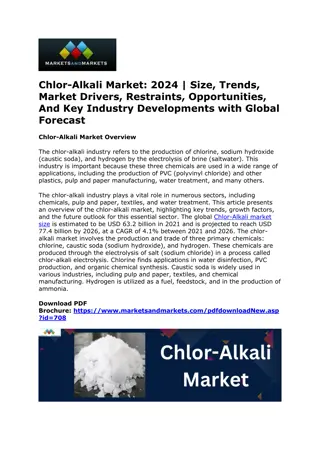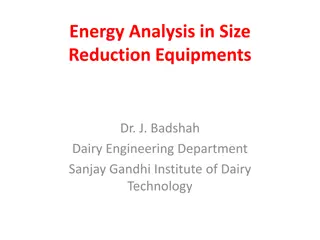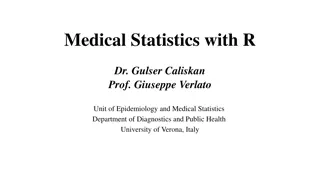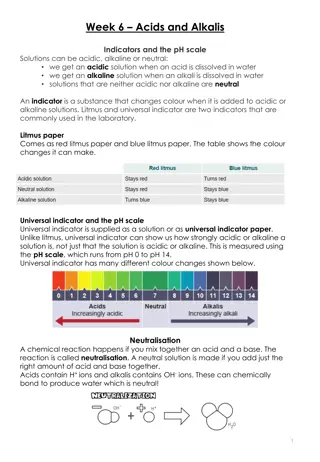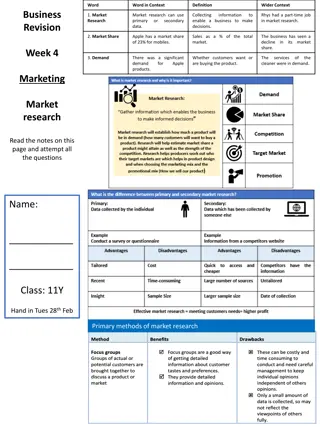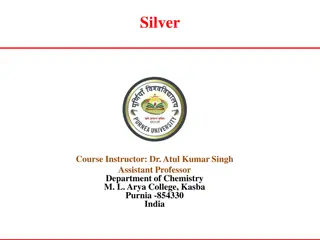Elevate Your Market Game: Polyol Ester Market Strategic Insights
Accurate business decisions demand insightful Market intelligence, and Growth Market Reports steps up to provide precisely that through its latest report on the Polyol Ester Market. This meticulous research offering equips businesses, both existing and new entrants, with imperative insights for maki
1 views • 3 slides
Chlor-Alkali Market SWOT Analysis, Size Comprehensive, Growth Forecast
The leading players in the Chlor-Alkali market are Olin Corporation(US), Westlake Chemical Corporation (US), Tata Chemicals Limited (India), Occidental Petroleum Corporation (US), Formosa Plastics Corporation (Taiwan), Solvay SA (Belgium), Tosoh Corporation (Japan), Hanwha Solutions Corporation (Sou
1 views • 5 slides
Magnesium Oxide Market Size, Worth, Overview, Scope & Analysis to 2022-2029
The Magnesium Oxide Market\u00a0research, a thorough examination of the state of the industry, market size, demand trends, development patterns, and projections from 2022 to 2029, was just published by Adroit Market Research.
0 views • 5 slides
Parcel Delivery Market Manufacturers Size, Share, Business Boosting Strategies
The Parcel Delivery Market,\u00a0research, a thorough examination of the state of the industry, market size, demand trends, development patterns, and projections from 2022\u00a0to 2032, was just published by Adroit Market Research.
0 views • 5 slides
Alternative Fuel Market : Scope, Size & Share Report 2022-2029
The Alternative Fuel Market,\u00a0research, a thorough examination of the state of the industry, market size, demand trends, development patterns, and projections from 2022\u00a0to 2029, was just published by Adroit Market Research.
0 views • 5 slides
Vertical Probe Cards Market Size, Share, Trends, Restraints, Growth
The extensive report on the Vertical Probe Cards Market by Adroit Market Research was just released. It provides a thorough analysis of the market's present state, size, demand trends, growth patterns, and projections from 2022 to 2032.
0 views • 5 slides
Fluorescent and LED T5 and T8 Tube Market Size, Share, Growth Driver
Adroit Market Research's most recent report, \"Fluorescent and LED T5 and T8 Tube Market \" Global Industry Trends, Share, Size, Growth, Opportunity and Forecast 2022\u20132032, offers a comprehensive study of the industry that includes market data.
0 views • 5 slides
Connected Agriculture Market Report 2019-2029 |Overview, Scope, Size & Share
The extensive report on the Connected Agriculture Market\u00a0by Adroit Market Research was just released. It provides a thorough analysis of the market's present state, size, demand trends, development patterns, and projections from 2019 to 2029.
0 views • 5 slides
Understanding Acids and Alkalis: pH Scale and Indicators
Explore the differences between acids and alkalis, learn about indicators, pH scale, and how to categorize solutions as acidic, alkaline, or neutral. Understand the importance of universal indicators in determining acid and alkali strength. Discover the disadvantages of using red and blue litmus pap
3 views • 11 slides
Determining Sample Size for Research Studies: Factors and Considerations
Sample size estimation in research is a crucial step that involves various factors such as effect size, population standard deviation, power of the experiment, and significance level. The effect size indicates the practical significance of research findings, with common measures like Cohen's d and P
1 views • 24 slides
Understanding Size Separation in Pharmaceutical Processing
Size separation is a crucial unit operation in pharmaceutical manufacturing, involving the segregation of particles based on physical differences like size, shape, and density. This process, also known as sieving or screening, is essential for improving powder mixing, particle solubility, and stabil
1 views • 31 slides
Understanding Comminution and Particle Size Reduction in Pharmaceutical Processes
Comminution is the process of reducing particle size from larger to smaller particles, crucial in various industries like pharmaceuticals. This operation involves milling, grinding, and size reduction to make raw materials usable. The particle size plays a significant role in pharmaceutical formulat
2 views • 50 slides
Calcium Hydroxide in Dentistry: Properties, Classification, and Availability
Calcium hydroxide, a versatile material in dentistry, has various properties such as high solubility, low setting time, and strong alkali nature. It is classified into non-setting and setting cements used for cavity lining, root canal sealers, and more. Available in powder form and as a light-cure s
0 views • 51 slides
Understanding Energy Analysis in Size Reduction Equipments
This comprehensive overview delves into the energy analysis involved in size reduction equipment, exploring topics such as objectives of size reduction units, sieve analysis for particle size distribution, mesh number system, and mathematical models for energy analysis in size reduction units. Dr. J
0 views • 11 slides
Empowering Farmers Through Market Surveys
The market survey methodology outlined in the content focuses on empowering farmers by increasing their understanding of market dynamics, building relationships with market players, and enhancing decision-making skills. It involves structured steps like sensitization workshops, crop selection, and i
1 views • 23 slides
Understanding Size and Spacing of Rural Settlements in Geography Research
This presentation delves into the significant influence of size and spacing on the distribution pattern of rural settlements. It explores how factors like population size, areal size, topography, soil fertility, and more impact the density and distribution of settlements, categorizing them based on
1 views • 15 slides
Advances in Sample Size Calculations for Clinical Trials: The ART Suite
This presentation discusses the importance of sample size calculations in research studies, especially in the context of clinical trials. It covers tools like ART and Power in Stata for binary and categorical outcomes, emphasizing the need to determine the right sample size to ensure research questi
3 views • 35 slides
Understanding Sample Size and Effect Size in Medical Statistics
Explore the crucial aspects of power analysis, sample size determination, effect size estimation, and their interrelations in medical statistics. Learn how these components influence experimental design and decision-making in research studies. Discover the significance of adequately balancing sample
0 views • 46 slides
Guidelines for Checking Poster Size & Layout
In this guide, you will learn how to check the size of your poster by customizing the slide dimensions to ensure it fits your easel properly. The steps involve navigating to the Design Tab, selecting Custom Size, and determining whether your layout should be portrait or landscape. Follow these instr
1 views • 7 slides
Synthesis of Salicylic Acid: Theory, Derivatives, and Applications
Salicylic acid is synthesized from methyl salicylate through ester hydrolysis with aqueous alkali. It is a versatile compound used in organic synthesis, as a plant hormone, and derived from salicin metabolism. The derivatives of salicylic acid can minimize gastric disturbances and enhance therapeuti
4 views • 12 slides
Solubility Rules from the University of South Carolina
This resource outlines the solubility rules for various compounds based on their chemical properties. It explains the solubility of compounds of alkali metals, ammonium salts, nitrates, chlorides, sulfates, and more. The rules provide insights into which compounds are soluble or insoluble in aqueous
1 views • 10 slides
Understanding Acids, Alkalis, Indicators, and the pH Scale
Solutions can be acidic, alkaline, or neutral depending on whether an acid or alkali is dissolved in water. Indicators like litmus and universal indicator help determine acidity or alkalinity. The pH scale measures this, with 7 being neutral. Neutralization reactions occur when an acid and a base re
0 views • 5 slides
Understanding Market Sharing Cartels in Oligopolistic Markets
Perfect collusion in oligopolistic markets often involves market-sharing cartels, where member firms agree to share the market while allowing some degree of freedom in their decisions. This can be done through non-price competition or quota agreements. Non-price competition cartels involve setting a
8 views • 8 slides
Understanding Sample Size, Power, and Hypothesis Testing in Statistics
Sample size determination based on estimation precision and confidence interval width is crucial in statistical analysis. By calculating the necessary sample size, researchers can ensure sufficient standard errors and confidence intervals. Additionally, the relationship between power and sample size
0 views • 50 slides
Understanding Market Research for Business Success
Market research is crucial for businesses to gather information about their target market, customer needs, competition, and market trends. Primary and secondary research methods, market share analysis, demand assessment, and calculating market size are key aspects discussed in this content. Various
1 views • 5 slides
Understanding Alkali and Alkaline Earth Metals in the Periodic Table
Explore the unique characteristics and behaviors of alkali and alkaline earth metals in the periodic table. Learn about the reactivity, storage, manufacturing, and general properties of these essential elements. Dive into the world of Group 1 and Group 2 elements to understand their role in chemical
0 views • 21 slides
Understanding the Chilean Market: Business and Cultural Insights
Explore key market factors, entry strategies, challenges, and the importance of finding the right partner when entering the Chilean market. Learn about market approaches, working with agents, and the unique business landscape in Chile, including competition, market size, and the role of economic gro
1 views • 27 slides
Overview of Feldspar Group in Geology: Types, Composition, and Properties
The Feldspar Group is a vital component of rock-forming silicates found in various types of rocks. Comprising two main types - Alkali Feldspar and Plagioclase Feldspar, they exhibit distinct chemical compositions and physical properties. These alumino-silicates are characterized by their atomic stru
2 views • 10 slides
Understanding Common Rock-Forming Minerals with K. Guru Brahmam
Explore the six common rock-forming minerals including quartz, feldspar, mica, olivine, pyroxene, and amphibole with insights from K. Guru Brahmam, a lecturer in the Department of Geology. Learn how these minerals are essential tools in classifying rocks and determining their color and composition.
0 views • 13 slides
Understanding Vat Dyes: Properties, Dyeing Process, and Limitations
Vat dyes are known for providing excellent color and fastness properties to textile materials, especially natural and manmade fibers. The dyeing process involves steps like aqueous dispersion, vatting, absorption by fibers, re-oxidation, and soaping off to ensure colorfastness. However, there are ce
0 views • 25 slides
Chemical Properties and Uses of Silver: A Comprehensive Overview
Dr. Atul Kumar Singh, Assistant Professor at M.L. Arya College, provides detailed information on the chemical properties of silver, including its reactions with air, halogens, acids, alkali cyanides, alkalis, and sulphur. The text also highlights the various uses of silver in coinage, ornaments, and
0 views • 7 slides
Nevada Class-Size Reduction Program Overview
The Nevada State Board of Education implemented the Class-Size Reduction Act to reduce pupil-to-teacher ratios in early grades. Research shows mixed results on the effects of class-size reduction, with studies from various states highlighting different outcomes. The history of class-size reduction r
0 views • 14 slides
Exploring Hydrogen and Its Compounds: Properties and Isotopes
Hydrogen, the most abundant element in the universe, has unique properties that make it resemble both alkali metals and halogens. It exists mainly in combined states, except in volcanic gases, and its isotopes exhibit distinct chemical and physical characteristics. The ionization energy of the H-H b
0 views • 37 slides
Understanding Acid and Alkali Reactions
Explore the effects of acid rain on soil and ecosystems, learn about pH measurements in solutions, and witness the reactions of litmus paper with acids and alkalis. Follow the journey of an environmental consultant assisting a farmer facing plant growth issues on his farm.
0 views • 15 slides
Characteristics and Families of the Periodic Table: A Comprehensive Overview
Explore the characteristics of the periodic table including the alkali metals, alkaline earth metals, transition metals, lanthanides, actinides, and more. Learn about the properties, valence electrons, and uses of different groups, such as the boron group, carbon group, nitrogen group, oxygen group,
0 views • 8 slides
Understanding BCG Matrix: Market Growth and Relative Market Share
BCG Matrix, developed by Bruce Henderson of the Boston Consulting Group, categorizes business units into Question Marks, Stars, Cash Cows, and Dogs based on market growth and relative market share. Market share and market growth are crucial factors in determining a company's position in the market.
0 views • 31 slides
Difference Between Capital Market and Money Market: A Comprehensive Overview
The capital market and money market serve different purposes in the financial world. While the capital market provides funds for long-term investments in securities like stocks and debentures, the money market deals with short-term borrowing and lending of funds. The capital market acts as a middlem
0 views • 4 slides
Understanding the Classification of Elements in the Periodic Table
In 1869, Mendeleev and Lothar Meyer published classification schemes for elements, leading to the development of the Periodic Table. This table organizes elements based on properties and reactivities, with each element having a unique atomic number. There are 92 naturally occurring and 13 man-made e
0 views • 31 slides
Understanding Alkali Metals: Group 1 Elements
Alkali metals, found in Group 1 of the Periodic Table, include elements like lithium, sodium, and potassium. These metals are highly reactive, with properties that change as you move down the group. They have low densities and melting points, and their reactivity increases from top to bottom. Learn
0 views • 12 slides
Particle Size Analysis in Industrial Pharmacy: Methods and Importance
Particle size analysis is crucial in pharmacy for determining the size range and properties of particles. This lecture covers different methods of particle size analysis, such as microscopy, sieve analysis, sedimentation, and electronic determination, along with the importance of particle size in ph
0 views • 47 slides

